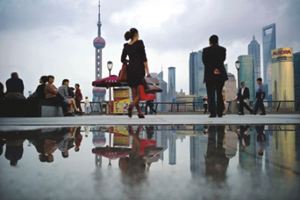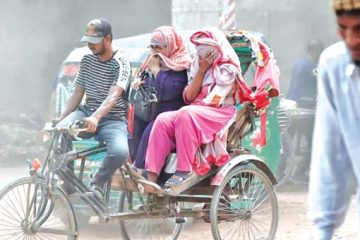Chindia policy to boost domestic trade
Kingshuk Nag
 When the G7 was formed in 1976 as a major economic and political group of the seven largest industrialised nations, not even the optimistic of soothsayers would have predicted that 23 years later in Pittsburg, USA, the G20 would dethrone G8 as the primary council of wealthy nations. This shift of power to a multipolar world, which signals the gradual fall of Washington’s influence and the complementary rise of Beijing-Delhi is not without reason as the G20 comprises an astounding 85 percent of the world’s economy and over two-thirds of the world’s population.
When the G7 was formed in 1976 as a major economic and political group of the seven largest industrialised nations, not even the optimistic of soothsayers would have predicted that 23 years later in Pittsburg, USA, the G20 would dethrone G8 as the primary council of wealthy nations. This shift of power to a multipolar world, which signals the gradual fall of Washington’s influence and the complementary rise of Beijing-Delhi is not without reason as the G20 comprises an astounding 85 percent of the world’s economy and over two-thirds of the world’s population.
Chindia surfaced in the international lexicon in 2005 and if the last decade of monstrous growth for both the countries is anything to go by, Chindia has every chance to find it being explained in the Oxford dictionary.
While the world economy contracted 2 percent in 2009, China and India registered growth of 8.7 percent and 6.8 percent.
However if there is one country in the world, which can claim to be good friends of Chindia and at the same time reap economic benefits from the economic prosperity of both these countries, it is Bangladesh. A quick flip through history books would tell us that while India had a major contribution in securing Bangladesh’s independence in 1971, conflicts of interests in issues such as trade and commerce, determining the limits of territorial waters, and sharing of Ganges clipped the wings of trust.
India-Bangladesh trade
India, till recently, was Bangladesh’s biggest trading partner and with the rise of India in the global stage, the importance of Indo Bangla relations cannot be ignored. Bilateral trade is heavily inclined towards India as in 2008-09, India’s exports to Bangladesh were about $2.8 billion whereas India’s imports from Bangladesh were about $275 million.
This basically means that Bangladesh is only able to pay 10 percent of its import bills from the foreign exchange it earns from Indian exports.
In the last five years, Bangladesh has seen drastic improvements due to concessions accorded by India, as exports have risen fivefold from $66 million in 2002-03 to $275 million in 2008-09 in just six years.
When the South Asian Free Trade Agreement was signed in 2006 following the South Asian Preferential Tariff Agreement (SAPTA) in 1993, India offered concessions on 2,500 products to least developed countries, including Bangladesh. Since then, India has rapidly reduced its negative list from 770 products in 2006 to around 260 in 2010 for Bangladesh.
One of the major problems of Bangladesh is the over reliance on the ready garments sector, which accounts for almost 5 percent of its GDP. Apart from that, energy constraints have severely crippled the growth prospects of Bangladesh as at present, the country faces a huge shortage in both gas and power supply. India’s growing relationship with Bangladesh can help cease the worsening situation from getting out of hand as India can make Bangladeshi ready made garments more accessible to its markets in the near future. Also, with the recent installation of a 120 MW power plant by Indian giant Bharat Heavy Electricals Ltd (BHEL) in Bangladesh and the deal slated to be signed by Indian Navratna National Thermal Power Corporation (NTPC) with Bangladesh Power Board this year, India’s foray in the power sector is a giant leap forward for both the countries.
India’s northeast is awash with significant economic opportunities for Bangladesh. In 2007-08, Bangladesh exported goods worth $30 million and imported $80 million worth of goods as India’s northeast is projected to increase its trade with Bangladesh. Improved infrastructure and transit links between the two regions would not only mean a good export market for Bangladesh’s goods but also open up unexplored markets in Nepal and Bhutan.
China-Bangladesh trade
China is the largest trading partner of Bangladesh as trade between the two countries clocked $4.60 billion in 2009. However, Bangladesh still maintains a huge trade deficit with China — while Bangladesh imports 16 percent of its goods from China, exports to China constitute a miniscule 2 percent. As per the Bangladesh Bureau of Statistics, a trade deficit of $3.8 billion existed between China and Bangladesh as of June 2009. Beijing recognises that this trade gap needs to be pruned and as such, it sends purchasing groups every year to Bangladesh to scour potential opportunities.
Bangladesh’s exports to China has been on the ascendancy in the last few years and with the recent removal of tariffs to about 5,000 Bangladeshi products to Chinese markets, the future looks radiant for Bangladesh. The commerce ministry, which described the offer as “stunning”, also stated that the duty free access of Bangladeshi products is without any condition and does not require a mutual action from Bangladesh’s side. Undoubtedly, this offer has been the culmination of years of a fruitful relationship with China and gives Bangladeshi entrepreneurs a great opportunity to access over a billion consumers in China.
China has offered close to
$7 million after it signed an economic cooperation agreement with Bangladesh, where China will offer support for constructing a deep sea port and help Bangladesh in installing a space satellite. Apart from the financial assistance, China’s economic prowess means an unearthed potential to direct Chinese foreign direct investment (FDI) towards Bangladesh especially after FDI has seen a drastic fall this year.
India and China together represent 20 percent of the world’s GDP and 40 percent of the world’s population. With six countries of G20 representing the Asia Pacific region, International Monetary Fund is gearing up to undergo a major reform to ensure equitable voting and power representation and Asian countries is expected to gain, led by Chindia.
Also, recent reports of China supporting India’s representation for a permanent seat in the UN Security Council underlines the growing economic and political clout of Chindia. Bangladesh is well placed to seize this unique advantage and should not let this opportunity to pass as a joint Chindia policy can help Bangladesh rise rapidly in achieving its economic and political ambitions.
The writer works for Standard Chartered Bank and can be reached at kingshuk.nag@sc.com.in







